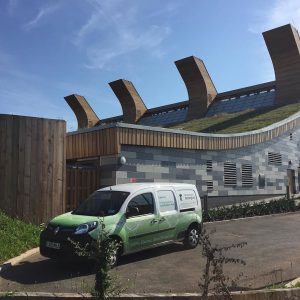June 18, 2018, by sustainablenottingham
Clean Air Day 2018: how you can reduce your exposure to air pollution
The connection between air pollution and our health has been studied for decades. Air pollution is known to increase the risk of certain health problems including lung cancer, and makes some existing conditions such as asthma worse. Clean Air Day, an initiative by Global Action Plan, aims to raise awareness of the health impacts of UK air pollution and share information on what you can do to reduce your exposure.
This Clean Air Day, 21st June, find out more about what the University of Nottingham is working on to improve local air quality, and some information on how you can get involved and help make the air cleaner and healthier for everyone.

Electric vehicles on campus
Many factors contribute to air quality in Nottingham and beyond, and transport is one of the biggest contributors in an urban environment. The University has invested in electric charge points and a fleet of nine Renault Kangoo electric vans, accounting for around 15% of the vehicles used by Estates and Catering teams on a daily basis. Staff and visitors can recharge their own vehicle for free at charge points on campus.
Improved hopper bus vehicles
From next academic year, the University’s hopper bus service will see newer buses with improved emissions across the whole fleet. Buses will have Euro VI engines, replacing an existing fleet with Euro III and IV engines, meaning that vehicles will emit significantly less nitrogen dioxide and particulates. Drivers also receive eco-driving training which encourages minimal sharp braking and reducing idling where possible, and vehicles are fitted with a system that reduces excessive acceleration demand, both contributing to improved air quality.
Green wall in Research, Acceleration and Demonstration (RAD) building
In terms of indoor air quality, the recently completed RAD building on Jubilee campus includes a green wall which has been installed at the main entrance. Indoor plants are known to reduce exposure to VOCs (Volatile Organic Compounds) that affect indoor air quality. Find out more tips for reducing air pollution indoors.
What you can do to improve air quality
Clean Air Day have put together guides and resources to help people understand the risks of air pollution, steps to minimise exposure, and information on how you can contribute to improved air quality.
Transport is a big contributor to local air quality: if you can, consider alternatives to driving to campus. The University actively promotes low-carbon options through a range of initiatives including investment in cycle facilities, salary sacrifice schemes for staff looking to purchase a new bike, and discounted bus, tram and train passes
Consider joining the University of Nottingham car share scheme for staff. The Liftshare scheme helps you find others commuting to the University with the same start and finish time
If you need to drive, switching off your engine while stationary can help make the air cleaner for you, other drivers, and pedestrians. Remember to regularly service your car to make sure it runs as efficiently and cleanly as possible, and keeping car tyres inflated to the correct pressure helps use less fuel too
Avoid the busiest streets when cycling and walking. Using quieter streets when cycling or on foot can lower your exposure to air pollution by 20%, especially during rush hour
Good ventilation is key to avoiding air pollution in the home: open windows when cooking or using cleaning products. Many cleaning products accumulate in indoor environments – by considering where you can switch to fragrance-free or naturally scented products you can help to reduce your exposure
Visit the Clean Air Day webpages to find out more about air pollution and tips to reduce your exposure.
No comments yet, fill out a comment to be the first

Leave a Reply